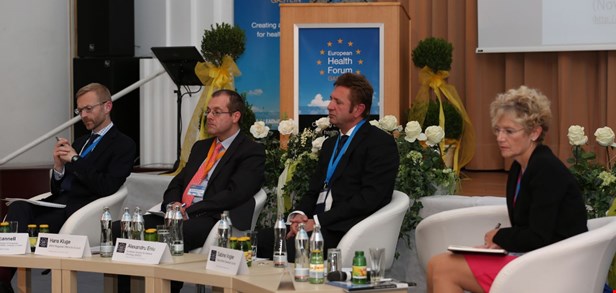EPF attends the European Health Forum Gastein 2015
 © European Health Forum Gastein
© European Health Forum Gastein
As in previous years, EPF had a strong presence at the 2015 forum. EPF team members were involved as speakers or contributors in several sessions while, on the third day, EPF held a workshop focused on patient empowerment as a vital element of high-quality, sustainable, equitable and cost-effective health systems.
Access was a prominent theme at the European health forum Gastein 2015. It was examined from different angles such as access to innovative treatments and integrating care, and a particular focus was on migrants’ access to healthcare
Camille Bullot, EPF Membership Officer, participated in the lunch session dedicated to patient empowerment organised by EPF. During this session, EPF presented the Patient Empowerment Campaign and launched its official campaign video to the many stakeholders present in the room: healthcare professionals, health stakeholders, decision-makers, researchers. Camille Bullot reminded participants of the ultimate objective of the campaign: calling on an EU Patient Empowerment Strategy and she concluded with a call to action, detailing the different ways to get engaged in the campaign.
Kaisa Immonen-Charalambous, EPF Policy Director contributed to a lunch session on “value” of innovation in health. In a world where medical innovations are prevalent, it is important to start defining their “value” - whether value for money, patients, or society. During this session, participants, through dialogue, developed the criteria needed to define the value of innovation, its definition and its scope.
Nicola Bedlington, EPF Secretary-General, spoke at a session on access to new medicines, organised by the World Health Organisation Europe and the Belgian and Austrian health insurance organisations where she underlined the need for more transparency on pricing mechanisms and what elements go into the final price tag. EPF also highlighted the intrinsic role of patients in defining valuable innovation and welcomed the trend towards bilateral and trilateral discussions between countries, moving towards a ‘Coalition of the Willing’.
Nicola Bedlington also spoke at the session focused on mHealth as a solution (and not a problem)” highlighting the fundamental link between the use of eHealth/mHealth technology and patient empowerment. Nicola described this as ‘connectivity in its widest sense’ emphasising that digital health literacy and confidence is key. In her closing intervention she called for user –driven technology asking how open are developers to working with patients as well as how open is industry to involve patients in the development and implementation of the code of conduct on apps. Finally, she highlighted that there is important unfinished business on securing quality and safety, data protection, access and equity, but the potential is clearly there.
Stanimir Hasurdjiev, EPF Board member, participated in a session on addressing multimorbidity: how to make it work for the patient? The session highlighted that coordination of care, shared decision-making, and a patient-centred approach are all essential to provide integrated care. He referred to the Patient Access Partnership which aims to tackle the challenge of multimobidity through a multi-stakeholder collaboration.
Stanimir Hasurdjiev also contributed to a session on adaptive pathways (MAPPs), and said: “Today’s patients are more knowledgeable than ever before and should be placed at the centre of their own healthcare decisions. Empowering the patient is, and always will be, a fundamental pillar of personalised medicine.”
